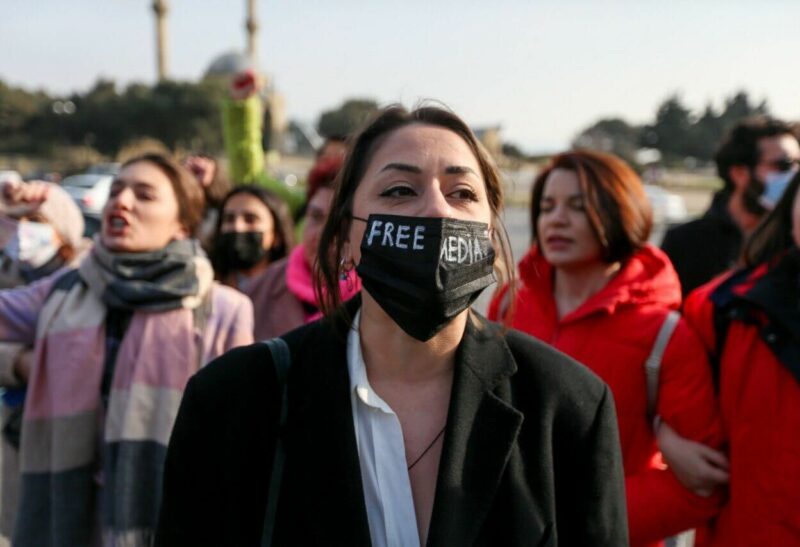On Monday, the Kurdish Regional Government (KRG) of Iraq held a controversial independence referendum despite the opposition of the central government and the threats of regional states (e.g. Turkey and Iran). 78 percent of the more than five million eligible voters cast their votes in the historic referendum which was declared “unconstitutional” by the Iraqi government. According to the early results, more than 90% voted for independence. The leaders of the KRG underlined that the referendum was non-binding and meant to provide a legitimate mandate for negotiations with Baghdad and other countries over the secession of the region.
The first serious attempt of the Iraqi Kurds for
de jure
independence has had reverberations across the entire region, including Azerbaijan, which has
a sizeable Kurdish minority
. It has sparked heated debates amongst the Azerbaijani expert community and political circles. The implications of the secession of the Kurdish region for regional stability and the future of Nagorno-Karabakh conflict are some of most discussed issues regarding the referendum in the country.
Azerbaijan has consistently adhered to the principle of territorial integrity in its positions on separatist attempts against the will of central governments throughout the region, including Kosovo, Northern Cyprus, South Ossetia, and Abkhazia. Most notably, regardless of the “brotherly” relations between Baku and Ankara, being aware of its negative consequences, Azerbaijan has kept its ties with Northern Cyprus at low level. When attempts were made to expand relations, Azerbaijan was warned by Greek authorities of the consequences and backtracked. For example, in early 2000s, Azerbaijan was gradually upgrading its economic ties with Northern Cyprus, among other things becoming the first state after Turkey to conduct direct flights to Nicosia. Athens subsequently dispatched a diplomatic group to Baku, warning the Azerbaijani leaders that Greece would take adequate measures concerning the Nagorno-Karabakh region unless Baku change its policies regarding the island. This was effective enough to
persuade
Baku.
For the Azerbaijani political elite, the Kurdish referendum, besides the possible repercussions for regional stability in the Middle East and the fight against the ISIS, is also at odds with the national interests of Azerbaijan and its policies regarding the occupied territories of Azerbaijan. Member of Parliament (MP)
Rasim Musabayov
points out
that:
Azerbaijan does not support the referendum held by the Iraqi Kurds. We strongly condemn any efforts violating the territorial integrity of Iraq. This is the official position of Azerbaijan.
MP
Vahid Ahmadov
stresses
that the holding of such a referendum is “a terrible, unacceptable” development for the entire region:
We have an analogous problem. We also suffer from separatism. That is why the Kurdish referendum is unacceptable for us. On the other hand, Turkey is the most important country for us. Everything against Turkey’s interests is likewise against our interests.
Azerbaijani political experts express similar concerns about the consequences of the secession of the KRG.
Natig Jafarli
, member of the governing board of the Republican Alternative (ReAl) movement, wrote in a
Facebook post
that:
This event will affect the whole region, including Azerbaijan. It will push us into difficult choices. But we are not ready for such challenges. Nor do we have a proper strategy.
Elkhan Shahinoghlu
, Director of Atlas Strategic Studies Center,
emphasized
the possible impacts of the independence attempt of Kurds for the future of the Nagorno-Karabakh conflict. Noting the visit of the veteran Armenian politician Aram Sargsyan to Erbil (the capital of Iraq’s Kurdish region) to observe the vote, Shahinoghlu writes that Armenia has demonstrated stealth support to the secession of the Kurdish region.
Armenia, along with Israel, is likely to recognize the independence of Kurdish region. It is not a coincidence that the chairman of Armenian Democracy Party, Aram Sargsyan, paid a visit to Erbil to observe the referendum. He is the ex-advisor of the former president of Armenia, Robert Kocharyan. His party plays the role of quasi-opposition. His presence in Erbil as an observer to the popular vote is the decision of official Yerevan.
Azer Gasimli
, another member of the governing body of the ReAl, has also
stressed
the possibility of a future partnership between an independent Kurdistan and Armenia. For him, “an independent Kurdistan would be an enemy to Turkey and all Turkic peoples in the region, which would become an ally of Armenia and other states that support anti-Turkic political groups.”
The only group in the country who publicly declared support to the Kurdish referendum on independence was the leaders of Azerbaijan’s Kurdish community. According to the official figures, there are 6,000 Kurds living in the country. However, some
argue
that this figure might be much larger:
“…Considering that… [the number of Kurds living in Azerbaijan] was at more than 40,000 in 1920s, the ethnically Kurdish population – concentrated in northern Nakhichevan and western district east and north of Nagorno Karabakh, as well as Baku – is likely to be larger, though with most having gradually adopted an Azerbaijani identity. Some of the key Azerbaijani political figures, including Heydar Aliyev, are believed to be of Kurdish descent, though the Aliyevs have never formally acknowledged that.”
Fizuli Tanriverdiyev
, a local official in Azerbaijan’s Lachin district, was one of the few Kurds who expressed support for the referendum, which sparked outrage in Azerbaijani media. Although Tanriverdiyev previously supported his position mentioning the existence of freedom of speech in Azerbaijan, after the public pressure he
deleted
his posts on social media.



